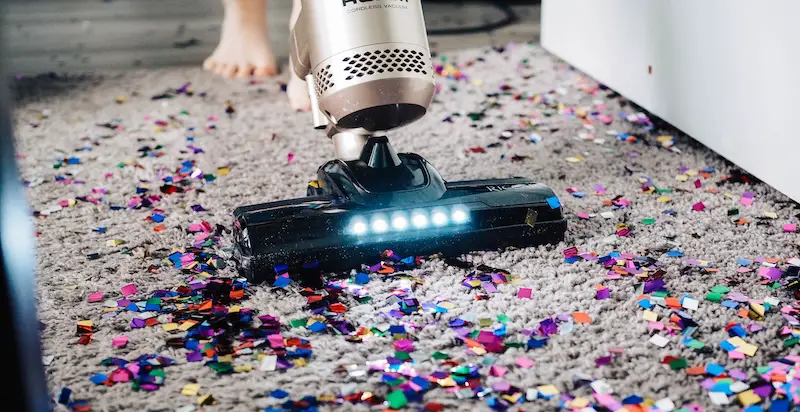5 Deep Cleaning Hacks to Spruce Up Your Home After Festivities

Once the hustle and bustle of festive seasons, events, and celebratory occasions come to an end, families are often eager to get their deep cleaning underway and bring back their homes to some sense of normality.
One study has shown that 72% of adults sleep better in a clean house, whilst 80% of participants agreed that they feel more relaxed with clean and tidy surroundings. So, how can you best prepare your home for a deep clean?
To help you get your house in tip-top shape, Josh Clarke, Manager at London waste collection company, Clear it Waste, shares top tips for deep cleaning your home following festivities.
Strategies for Effectively Cleaning Your Home After Festivities

1. Use natural cleaning remedies
Whether you’re trying to be more eco-conscious or simply trying to save a little cash, there are plenty of natural ways to clean your home.
A study found that a weekly average of £2.70 was spent on cleaning products in 2022 and to save yourself the pennies, some of the natural remedies are as effective as some of the pricier brand name products available to purchase. The best thing about taking this route is you’re likely to find many of the ingredients needed lying around the home.
A great non-toxic ingredient to use as a cleaner is bicarbonate soda. This common kitchen ingredient is a brilliant all-rounder, known for its cleaning and deodorising capabilities, as well as its power to remove stains and soften fabric.
Another common kitchen staple, vinegar, is also excellent at cutting through grease, mildew build-up, and has great water softening properties. Again, it’s non-toxic, so it is perfect to introduce to your cleaning routine, especially if you’re looking for products that are kind to the environment and safe to use around pets and children. .
Finally, cornflour. Whilst you may know this product for its excellent gravy-thickening abilities, it can also be used to clean windows, soft furnishings, as well as absorbing spilt oil and grease.
Two simple ways to have your home smelling fresh is through the use of natural ingredients, is by using herbs and essential oils that both have disinfectant properties, or via fresh lemons.
For those looking for less harsh chemicals around the home, the citrus fruit offers the perfect alternative to bleach, whilst still ensuring the home smells sweet.
2. Schedule your time and plan ahead
For many, cleaning can be quite a tedious task, and therefore something people will try to avoid for as long as possible. Luckily, there are a variety of things you could do to help take the pressure off your spring clean schedule this New Year.
Firstly, creating a to-do list and marking your progress by ticking things off can seem like a tiny, unnecessary step, but once you start to cross things off your list, it’ll help you feel a sense of achievement as you progress through your cleanse. Doing so, will also help to understand the magnitude of each task, which will allow you to designate and utilise your time more efficiently.
Another important pre-cleaning step is to decide on a room or areas to tackle in a single day. Attempting too much in one day will naturally lead you to feeling bored and lose focus. Instead, dedicating your time and effort to fewer tasks throughout the day can help make the tasks ahead seem much more manageable.
3. Create cleaning plans and goals
It’s likely that the essential cleaning products and tools will already be in the home, so there’s no need to splash out after a long month of gift-giving.
Just like with resolutions, it’s important to create plans and goals for the year ahead through setting standards and establishing boundaries that you are able to commit to.
Try creating a set of goals for each room of the house to lessen the pressure and ensure a deep clean has been prioritised in every corner and crack.
Kamalyn Kaur, Psychotherapist, comments on creating realistic cleaning goals for the new year:
“The festive period can be very chaotic; stressful; and eventful. There is often not much structure or routine during those days as everyone is on holiday mode – all of which is great for the short term.
However in the long run, this type of routine is not sustainable and nor is it very productive. When setting goals, always ensure that your goals are realistic and attainable. So many people set unrealistic goals which means by the third week of January, they have already given up on them.
Remember, the new year has 12 months, not one. So, all your new goals don’t have to start in January. If you are lacking motivation at the start of the year or experiencing post festive fatigue then you still have the option of 11 other months in which you can start pursuing your goals.”

4. Declutter and limit the chaos
It’s reported that over 90% of the UK have clutter in their home, mostly kept in the loft, cupboards and drawers. After the Christmas season, the perfect time to get rid of those unwanted items, waste and anything that takes up space is during January.
One of the first things households will be throwing out in the New Year is their Christmas tree. Reports suggest that the UK dumps an estimated 160,000 tonnes of real trees each January. Instead, plant it in a container to reuse for the following year. Doing so will eliminate any stress the plant may feel from being dug up again and give you a constant healthy, home-grown Christmas tree.
Whilst decluttering, it is important to prioritise recycling throughout the home, especially as around 114,000 tonnes of plastic packaging will be sent to landfills instead of being recycled in the UK, according to reports. Using a separate bin can help you differentiate between general waste and recycling, using this idea for each room can be a great way to save time whilst saving the planet.
Kaur says on the impact of a cluttered home:
“A cluttered or untidy environment can make you feel chaotic, overwhelmed, confused and many other negative emotions, all these feelings have the potential to lead to an individual feeling stressed and anxious. A cluttered environment adds to the “busy-ness” in your head.
Having a tidy and uncluttered environment will help you to feel organized; clearer; and more in control. It will improve your productivity, focus and allow a sense of accomplishment after a festive-filled busy period.”
5. Pay attention to the forgotten jobs
Studies indicate that the average person deep cleans their home five times a month, but even then certain areas or items are forgotten, such as the top of the kitchen cupboards, drains and curtains.
It is therefore advisable to start with the tasks that are higher up in your home, that often lack attention and care. Once complete, move onto surfaces and items that are average height, and lastly clean the floor. This is so that any dust, dirt or grime doesn’t ruin any spots that were previously cleaned.




















